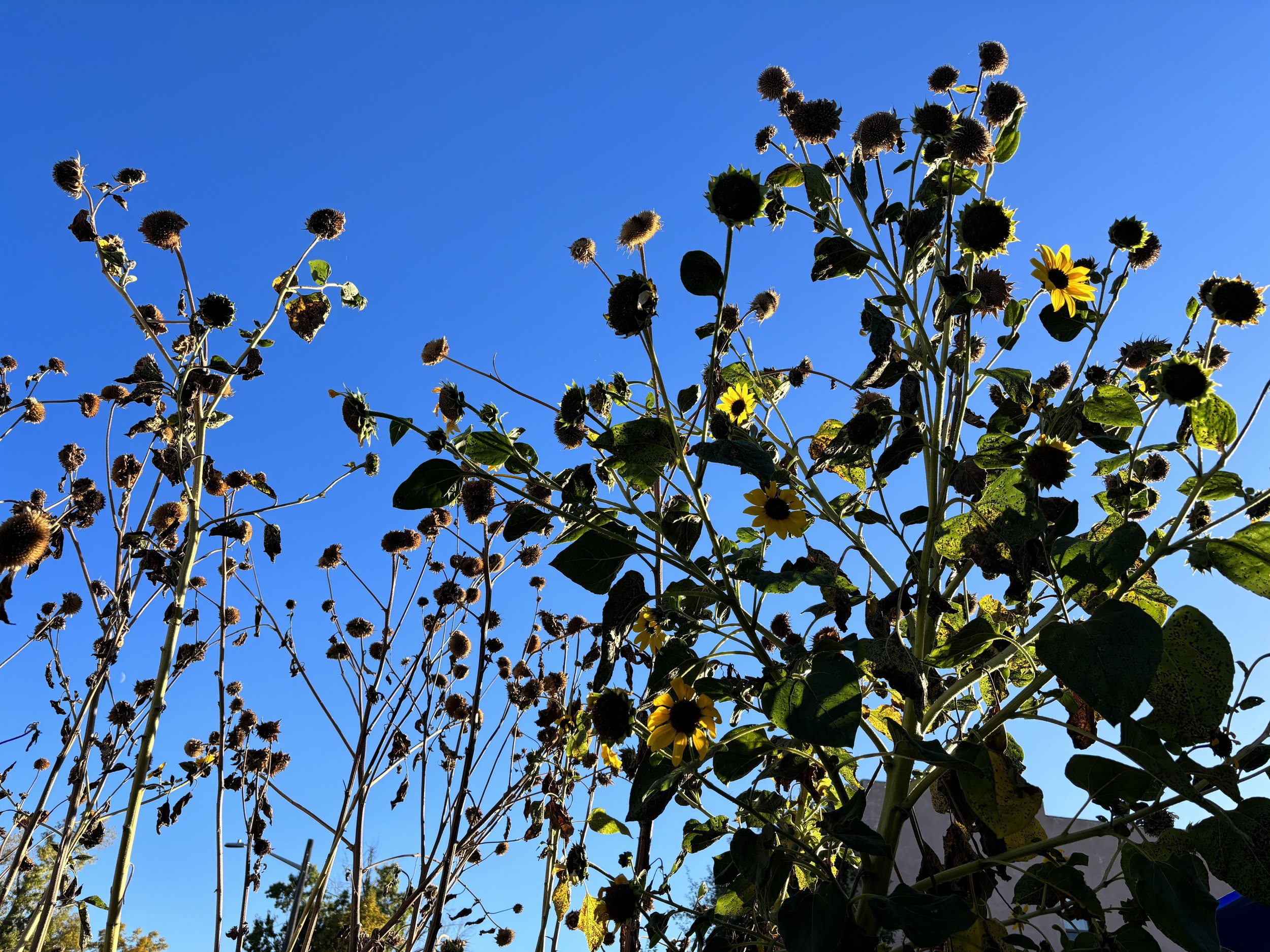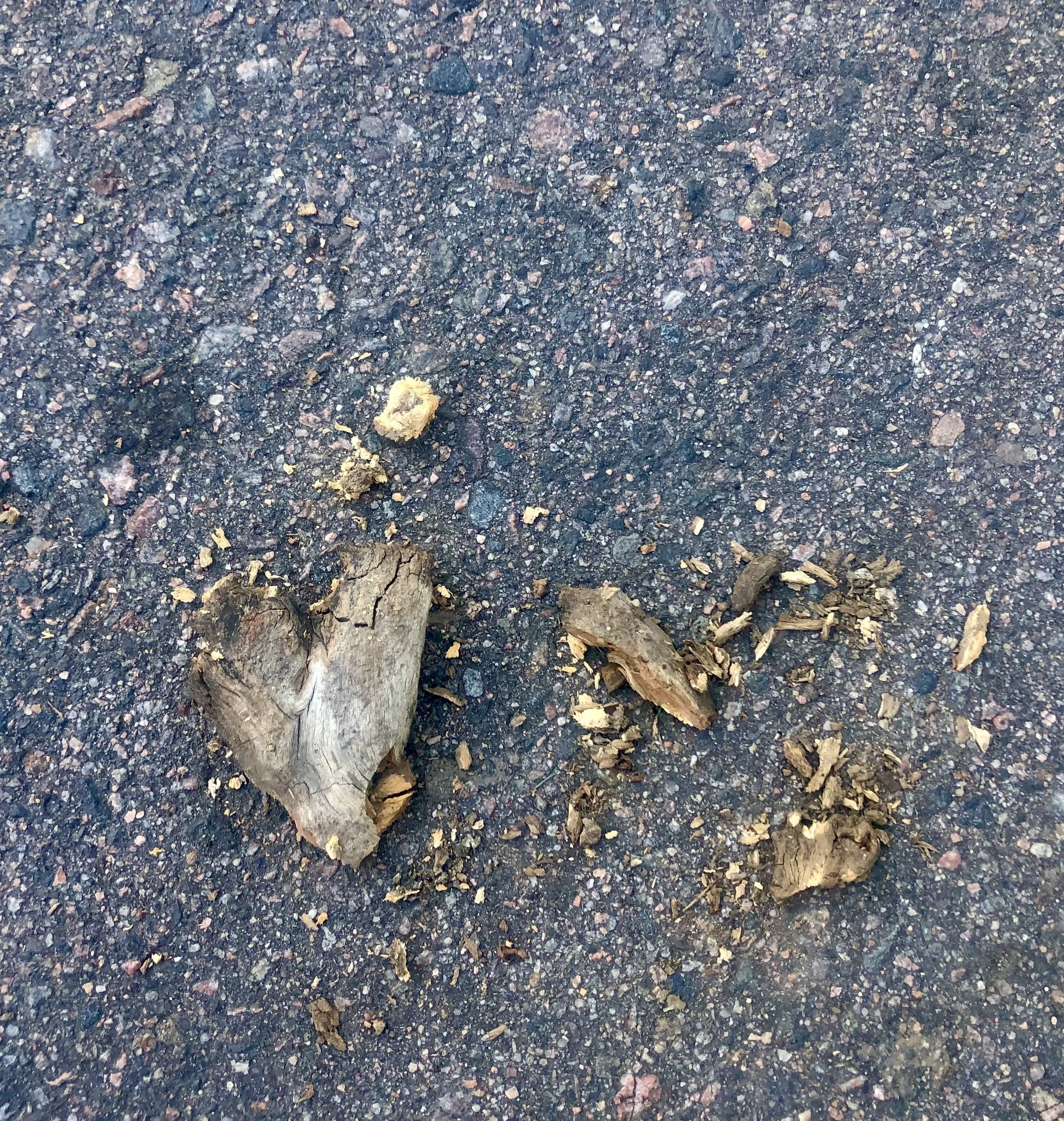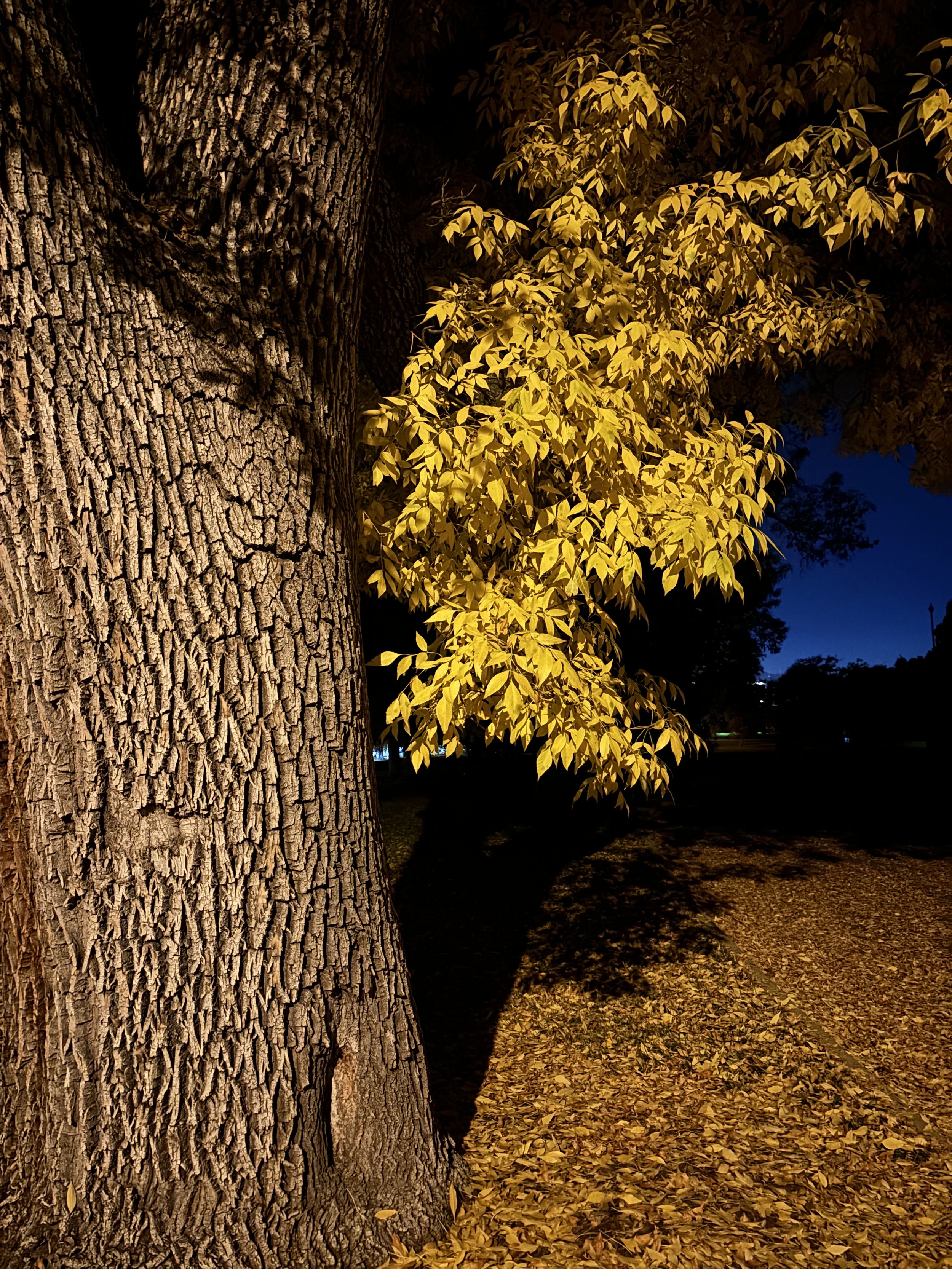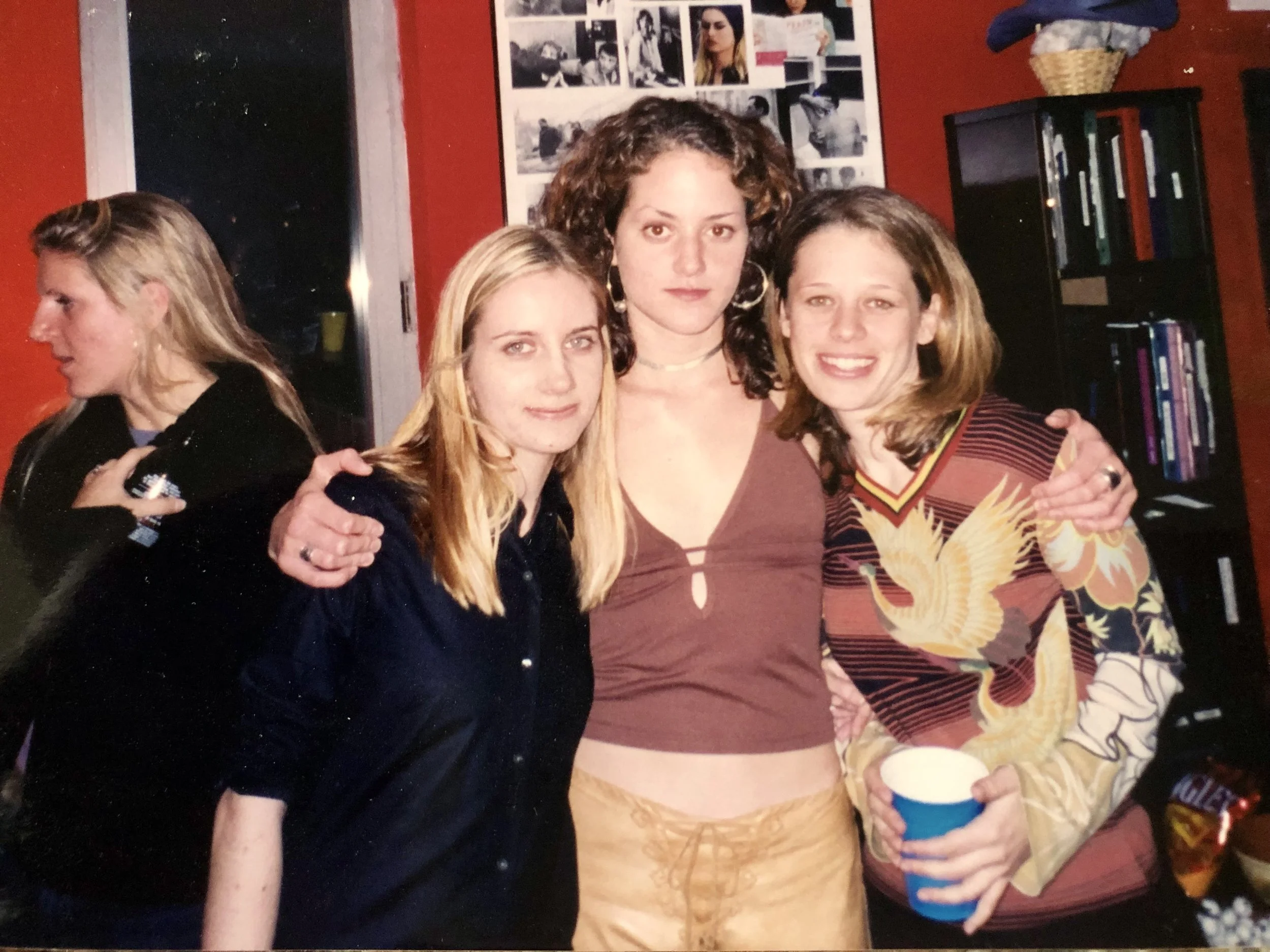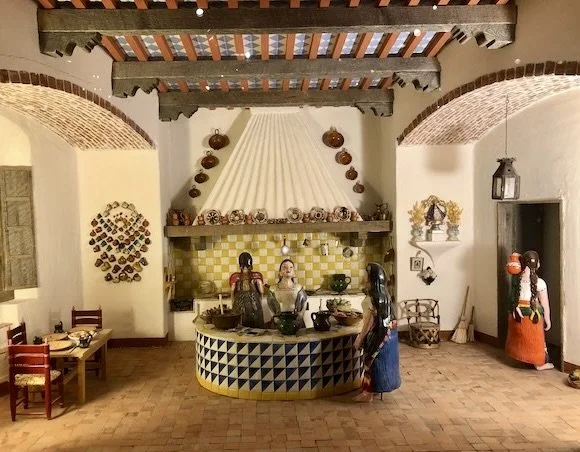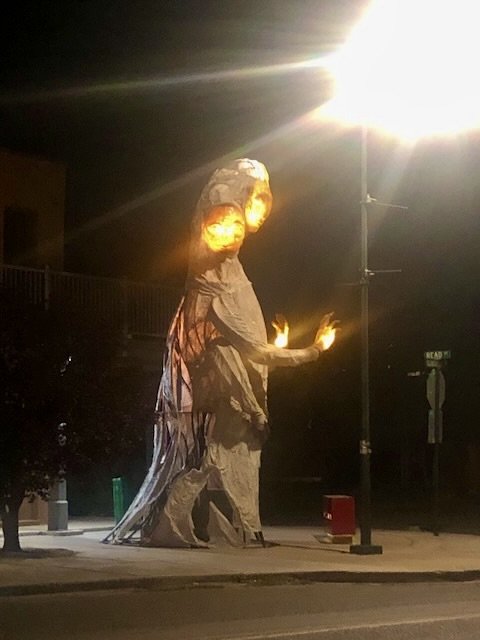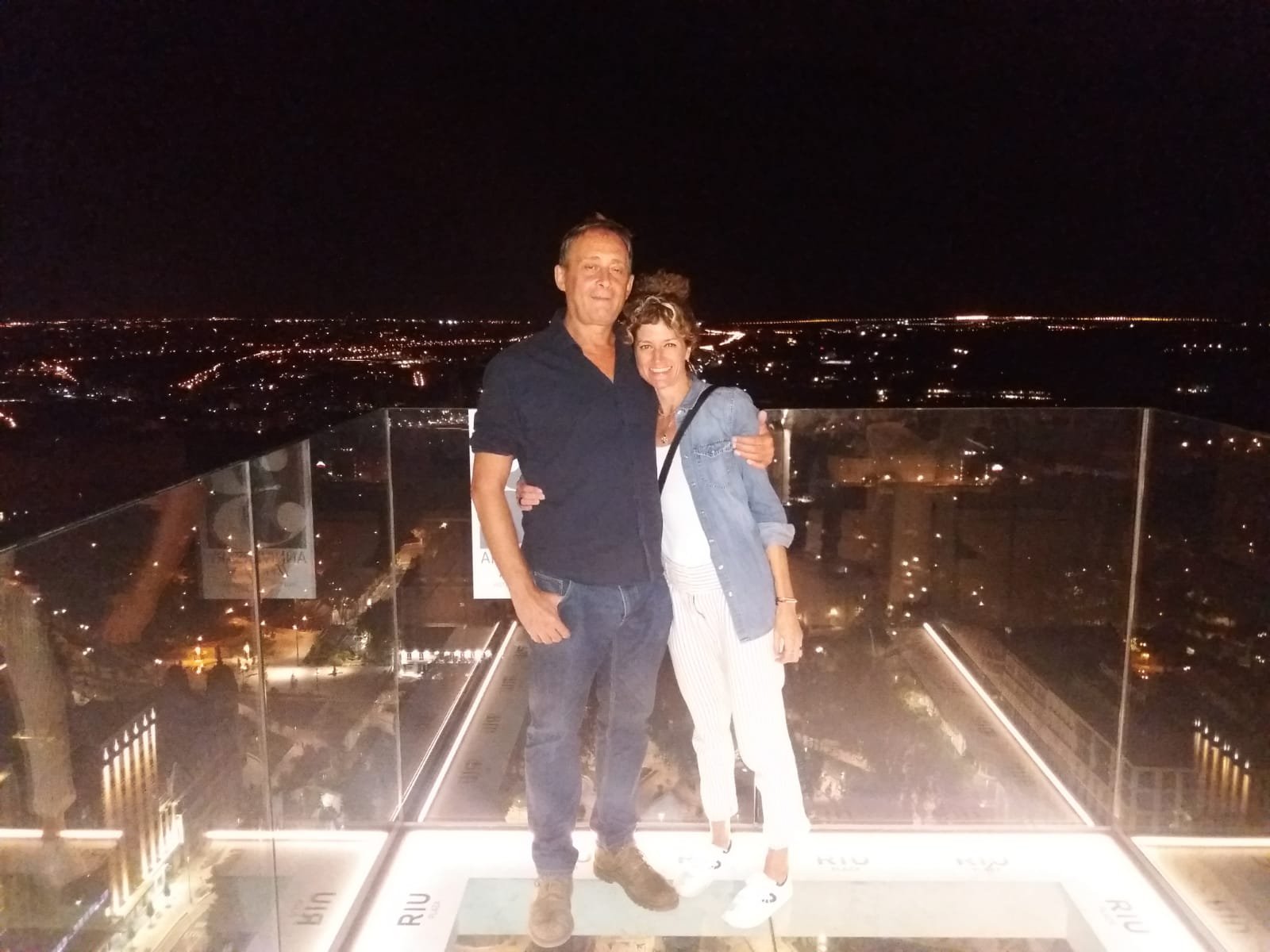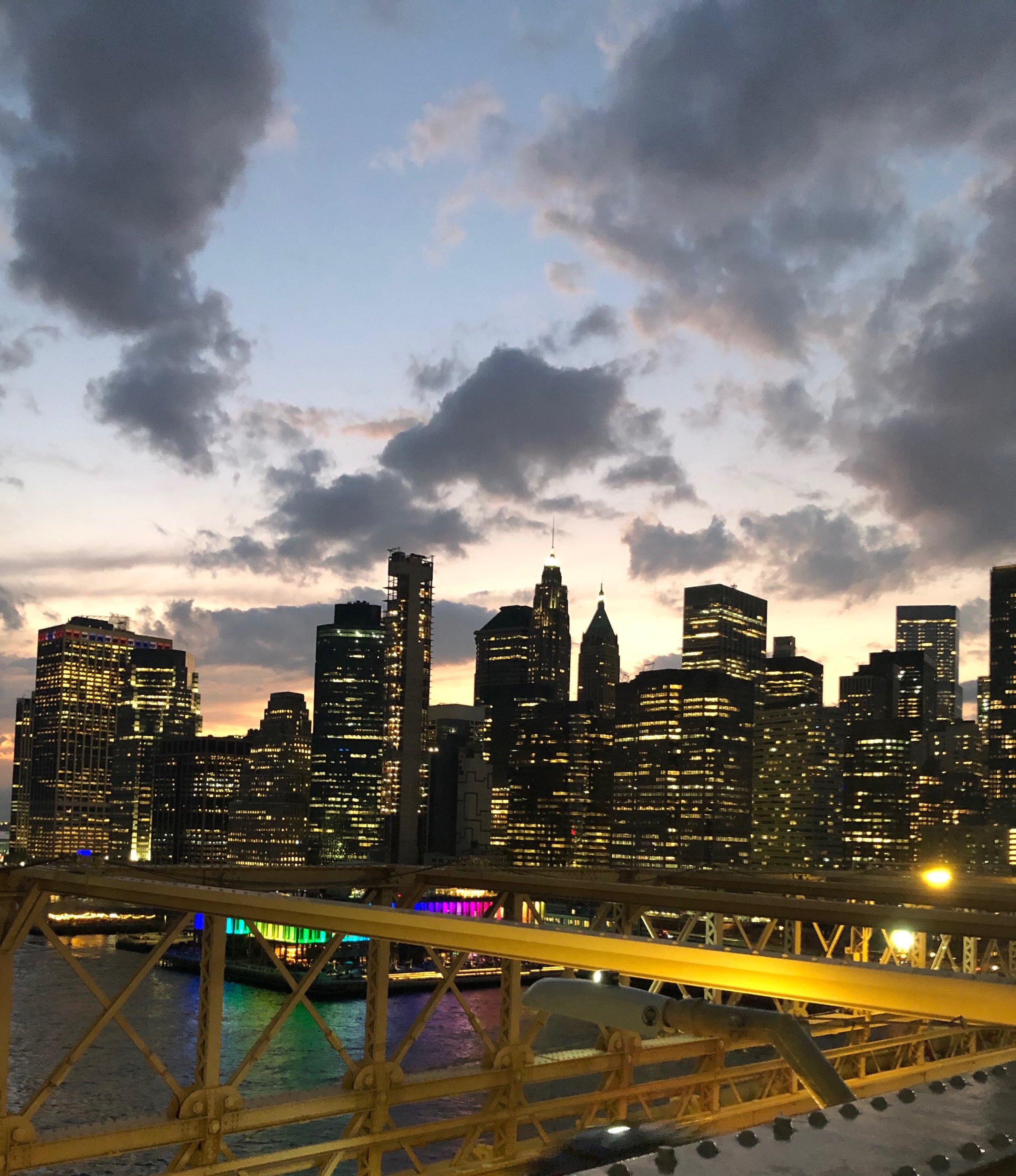Hope in Tongues
I’ve always been fascinated by language and languages. My early diary entries were written in a sophisticated code, wherein each letter was represented by another letter. I grew up in an American family very typical of its place and time: only English was spoken -- but I was drawn to languages, and to ‘otherness’ in general. I befriended the kids at school who spent part of their day in English as a Second Language class, and wore interesting shoes or barrettes. I listened with fascination as my Saudi neighbor friend cursed at her brothers in Arabic. I have portions of Bar and Bat Mitzvah ceremony prayers committed to memory. My child perspective did not include awareness of what was correct or political. Difference was exotic and relatable, at once.
I spent a lot of time across the street, at my best friend Nicky’s house. Nicky’s parents and grandparents immigrated from Cuba in the late 1960s. Their house featured dark Spanish-style wood furniture, hanging textiles, arresting house plants, and the distinct absence of adult supervision. Her father had left, her grandparents died — and her mother worked as a mortgage broker in the days when most transactional jobs still required daily presence in a central office.
Brought to life by his passion for watching and tracking the statistics of televised sports competitions, her older brother Rene could often be heard shrieking hysterically from his bedroom. Otherwise, Nicky’s house offered almost unbridled freedom. They also had snacks unlike anything that existed at my house: potato chips, Goya cookies, and savory galletas Cubanas -- which I found extraordinary and delicious. Her mother threw parties from time to time – their living room and upper and lower decks filled like a cocktail tumbler with an intoxicating mix of cigarette smoke, merengue music, and men wearing cologne. I was beguiled by this infusion of sabor to the Saltine blandness and superficially good behavior that characterized the suburban Portland housing development where we grew up in the early 1980s.
Nicky’s house was an incubator for creativity: we choreographed routines to songs from Wham! “Make It Big” and Madonna’s “Madonna” album. We founded and developed at least one imaginary business, The Hayes Modeling Agency – inspired by Maddie Hayes from “Moonlighting,” as well as our neighbor, Jack Guy. Jack was in his 20s, drove a red convertible, and modeled underwear for JC Penny. We rang the Guy doorbell from time to time, hoping for a Jack-sighting. He was never around. His mom, Mrs. Guy, usually answered the door in her bathrobe -- and upon being presented with a handful of dandelions, would reach into the candy bowl. We walked away contented with our sweet consolation prize. I wanted to believe it was Jack’s loss – but who was I fooling? I was ten: skinny, all limbs, reasonably intelligent, but not cute. . . at least not in the agreeable-oatmeal sort of way. My self-doubt nothwithstanding, had Jack been named Rolando or Pepe — and had he been dancing merengue with a cigarette hanging out of his mouth — our love would have been non-negotiable.
Nicky’s mom insisted that I’d spoken Spanish since I was four – the eldest generation in their home didn’t speak English, and children have highly absorbent brains. My interest in speaking Spanish was revitalized when I became an adult. I’d lived in Italy and spent time in Russia – but Español always felt closest to home. My pursuit of language mastery has been motivated by a drive to connect – and to connect by expressing myself with style. I wanted to be skillful when relating with gentlemen of Latin descent – thus I learned words like ‘betrayal,’ ‘hooked,’ ‘fooled’…all staples of my vocabulary in both Spanish and Italian. These days, I’m motivated by a desire to communicate insight — though I’m not convinced that insight is always best conveyed in words.
Drawing by Saiman Chow
Following the eruption of Mt. St. Helens in 1980 – and before we grasped the principles of supply and demand – Nicky and I held an ash sale. We collected from the several inches of volcanic ash that blanketed the streets of our neighborhood and rang our neighbors’ doorbells, offering what was already theirs for a nickel a bag. Funtime Daycamp was our most lucrative venture, several years after the eruption. For three summers in our ‘tweens, we entertained the younger neighborhood kids with nature walks, theatrical productions -- and usually completed the week-long ‘session’ with some sort of wearable creation involving fabric paint applied with hands, feet and potatoes. Nicky and I each walked with a few hundred dollars, and the knowledge that we had the capacity to make something happen.
The word ‘esperanza’ in Spanish means both ‘hope’ and ‘waiting.’ It makes sense that these two meanings live like twins inside the womb of ‘esperanza,’ an incubator for the future. To hope involves a great deal of waiting – and waiting implies that hope exists. This is why hope is precarious: if we were not waiting, we would have to reckon with the present. What could we possibly do but live in our mess? Nevermind that the world is on fire as it cascades into the sea. Nevermind that democracy in America is being slow-roasted over the incandescent coals of women’s sovereignty — to the extent that sovereignty ever existed. Nevermind that despite the world’s innumerable tongues and tools, we wander directionless. Truth - limitless and vast - continues to be a pathless land. Krishnamurti also said that even the act of naming something robs its vitality, makes it small. To define something is a narrowing.
What Nicky and I didn’t realize is that we were peddling a kind of promise: volcanic ash is fertile soil - because it is young, and because it retains the nutrients that existed in the original rock.
And so we move through the world: saying words, watching things explode — collecting ash in sandwich bags, selling it door to door.
Leather Pants
In the early years of my relationship with New York City, I was going to graduate school for film. I had a couple of sources of employment: I worked ten hours a week in the video library. In those days -- when I wasn’t too busy knitting a sweater that a boyfriend would later lose to be bothered to help my fellow students -- we loaned out vhs tapes. I also taught yoga -- mostly at a studio in Triburbia, also known as Tribeca.
It was 1999: it was before the days when you could throw a piece of rose quartz and hit five yoga instructors on any Manhattan sidewalk. Actually, I was head-hunted as a yoga teacher – I kid you not. It wasn’t because I was an extraordinary teacher; I wasn’t. I was good enough. I was good at remembering people’s names, I was disciplined, I was naturally flexible and had been practicing yoga since I was a kid, and I could do a unitard justice. . . but nothing resembling enlightenment had been achieved by 20-something Hilary Downes – neither has it been by 40-something Hilary Downes. Nonetheless, my over-tweezed eyebrows and I sweated and stretched and breathed with other aspiring, perspiring and inspiring city folk at the end of the millennium.
I had already earned the nickname ‘fancypants’ during one of the internships I had in the city during college – a name inspired by my shiny red low-slung flares from Dollhouse, a store which used to exist on Bond Street and Lafayette, just a few doors east of Other Music. I had a taste for idiosyncratic pantalones since the beginning of my clothes-wearing days. In grade school, I remember convincing my mom to indulge me in an Esprit number for back-to-school – they were orange and royal blue-checked, with an exquisite black fish motif. My purple crushed velvet legging phase ruled the early ‘90s in the Pacific Northwest. I had good luck with pants during the year I lived in Florence, Italy – daily slabs of salty, oily focaccia bread notwithstanding. Pants I bought in Italy were, surprisingly, long enough – which was not an easy box to check for me, a tall woman of Norwegian descent. This is all to say that I never had – and still don’t -- big boobs or full lips, or any butt to speak of – but I had long legs, and I celebrated pants. I still do.
One of my first friends in film school was a southerner named Kendall – who ended up becoming ‘my producer.’ I include quotation marks only because I feel and felt undeserving. . . who was I to have a producer -- Kathryn Bigelow? Jane Campion? Maya Deren? Kendall was gifted with a force of will, single-mindedness, and an ability to make things happen. She also happened to have confidence in me. My own sense of confidence was a house of cards: I oscillated between grandiosity and worthlessness. I was drawn to writers like Dorothy Parker and Sylvia Plath; I, too, had angst that I wanted to share with the world. A professional editor who volunteered to edit my thesis - and later fired me - called me ‘Plathological,’ which I thought was clever and insightful, if biting.
When Kendall introduced me to Jordan, it was among the first of many connections she made for me. A former model, Jordan was looking for a yoga teacher to help him recover from injuries sustained while renovating his loft on West 29th Street. More importantly, Jordan owned a company that made leather pants, all by hand -- no hardware, no grommets or zippers or hooks and eyes. . . nada. Just the skin of animals wrought by the hands of human beings. Kendall insisted that I must have a pair of these custom-made leather pants. I couldn’t afford them – I was a 20-something year-old graduate film student who taught yoga for a living. Ever the producer, Kendall suggested I see if Jordan would barter with me. She was right: Brittney Spears had a pair, so did Cheryl Crow and Lenny Kravitz – and Jordan’s work was featured in Vogue. Clearly I, too, should I have a pair of handmade leather pants, customized for my bod.
Caryn, Alexandra, me in the leather pants, and Kendall - 1999
I was reminded of these pants – invite me somewhere special and maybe I’ll wear them for you – when I visited the Loretto Chapel in Santa Fe, New Mexico. I am not a woman of religious devotion, but I am interested in crafts people, and in miracles – few and far between as they are. This chapel is famous for its staircase: two perfect 360-degree spirals, the absence of any center support, and an entire construction created without nails or any other hardware: just wooden pegs and the obsessive genius of someone without power tools. . . an unknown, non-celebrity staircase engineer.
The mythical spiral staircase of The Loretto Chapel, Santa Fe, New Mexico
From the spiral staircase in the chapel, I was inspired by the self-possession and determination of Georgia O’Keeffe, who loved – among other features of the natural world – shells: spirals. She was something of a misanthrope — and who could blame her? O’Keeffe also noted, quite astutely, the ephemeral nature of happiness. “Happiness is something that goes like the wind – but interest can last longer.” I remember Kendall said to me once that it was important to be deeply interested in my idea –making a film was a long and arduous process, and an idea would have to be able to sustain many threats to its manifestation. A couple of decades later, I remain convinced that staying interested and curious – in anything, really -- is among the most important work of this life. There is little else as worthy.
Georgia O’Keeffe
Art and ideas are antidotes for misanthropy – these are realms where we can be reminded of the innate genius of human beings, for the depraved wastrels that we are. I was immersed in these cleansing waters yesterday when perusing collections of folk art from around the world: every culture in the world creates representations of itself with great distinction and imagination -- using whatever materials are available.
For another day or so, I will continue to inhabit this adobe house — with chiles ristras hanging outside for health and good luck. . . this shell at the end of Amado Street in Santa Fe. ‘Amado’ means ‘loved’ in Spanish. Maybe love is a shell that contains greater possibility. Amado is a dead-end street, just off of West Manhattan Avenue. Here, I experience solitude differently than I experience it at home – here, it feels full of possibility. Here, it is not a trap, but a portal: a place from which I can paint my own landscape, rather than try to imitate the ones that others have painted. In this adobe house, this ‘dos casitas,’ two houses are contained: one is for me, and the other is where my most devoted and reliable companion awaits me: my imagination, my interest, my curiosity. Here, there is room for both of us, and we are both loved.
A Very Nice Man
When I arrived in Mexico City a couple of weeks ago, I went looking for a leafy sidewalk bistro I'd visited last July. I remembered glancing up from the menu and spotting an old friend and her dog just steps away -- someone I knew from New York who I hadn't seen in at least a decade. I wondered if something equally magical might happen if I placed myself there again.
One singing guitar player came by, then another. . . and then, a man pushing a cart with a little boy riding in it. They asked if I wanted a shoe shine. Having not yet checked into my room or changed my clothes since arriving from Oaxaca, I was wearing heavy leather boots. I hesitated - the boy was young. I looked at the man; he seemed gentle. The boy appeared to be loved, and didn't have the vacancy in his eyes that you see when people have left their bodies.
The little boy sat on a small wooden box while he unpacked cloths and brushes, and a few different glosses and glazes. He instructed me on where to prop my boot, and proceeded to clean, polish and buff while I asked him how old he was, was he in school, what was he learning. He told me he was seven years old, he'd been working with his father since he was three -- his school was just a few blocks away. . .and he was learning English. He shared a series of words and phrases he'd committed to memory, howareyou, iamfine, what'syourname, myfavoritecolorisred.
The father, sitting on a bench nearby, returned to the table when he saw the boy putting the finishing touches on his work -- and asked if I wanted him to redo it. No thank you, your son was very professional, I told him. The father signaled the boy to pack up the gear while I paid the father and thanked them both.
I watched them clean each other's shoes with patience and care a few feet away before the father lifted the boy back onto his seat on the cart. The boy turned and waved to me as the father pushed the cart down the street.
Boy on the metro, Mexico City
I've been in graduate classes with people in their 20s who have never had a job before -- and this boy was a working professional at the age of seven. What gets lost or delayed in developing a sense of selfhood when everything is handed to you?
Mario is a rare and wonderful person -- fiercely intelligent, visionary, generous, high-spirited, a gifted and inspiring teacher. . . he makes no apologies for himself, and instills a similar kind of self-confidence in those around him. I can only speculate about what creates such a person, but I wonder if it stems at least partly from having grown up being different -- and adapting to one's sense of 'difference' by becoming one's own greatest ally -- a practice of effort and will, both which Mario reminds us are required for yoga. Mario has internalized the philosophy and wisdom of yoga like nobody I have ever met.
When the seas part for you, you miss out on the opportunity to want with any conviction; too much ease fuels complacency. Isn't the pleasure in life at least partly in the wanting? Putting aside questions of justice — adversity and friction can fortify one's sense of self.
None of this is big news: privilege and too many unearned advantages foster a kind of myopia and fragility. None of us exist here without suffering and challenges — but people who haven't had to surmount major obstacles for basic survival may need to engage greater effort and will to achieve perspective than those who have walked minefields throughout their lives.
A friend told me a story about his mother's dementia. He came out in a time when being gay wasn't considered normal and acceptable, and his sense of feeling embraced and known by his parents was always compromised.
On one of their final visits, the mother no longer remembered him. My friend pushed his mother's wheel chair on the grounds of the home where she lived - they stopped for a moment and she said, 'I don't know who you are, but you're a very nice man.'
The Light We Seek
I've been listening to Amelia Rodrigues in the last few days; one of her songs playing in a Portuguese restaurant in Barcelona last week inspired my renewed attention to fado music. Fado - like boleros, or the blues - expresses the melancholy that results from loss and longing. Stenciled on the wall of this restaurant was a quotation from Nick Cave -- something about how humans yearn to be transported from darkness to light. It is perhaps the most fundamental human drive besides basic survival -- a drive to oneness, to reconnect with the whole, the divine, the light, god, dios. . . call it what you will. We go about this in many ways -- usually misguided. The beauty of our interrelatedness is that someone else's expression of an internal state that we know - through a song, a painting, an embrace - can help us transcend that state, and thus get a glimpse of the light we seek.
The tsunami of tourists inundating capital cities in Europe I've visited in the last couple of weeks has me thinking about human migration -- about movement from one part of something to another. It's not dissimilar to the movement of other earthly elements - glaciers melting, waters rising, tectonic plates shifting. . . human migration is both informed by and a reflection of these other types of elemental displacement. Perhaps torrents of consumers flooding Madrid, Barcelona and Athens are not all that different from waters engulfing Pakistan and Alaska.
It is no secret that Catalonians are known for being protective and at times even hostile toward those they perceive as outsiders -- particularly in recent years when tourism in Barcelona has reached epic proportions. There are all kinds of historical, social and political reasons for this guardedness that should not be overlooked. On the surface, though, tourism seems to be a big variable. It's understandable that one might have a negative response when living in the crush of vacation liners dumping loads of consumers in the place you call home. That hostility is an imprecise weapon, though; we are living in a world where few people stay fixed in the place they were born — and Barcelona is no exception. We're living in a world that is defined by migration and movement -- and it seems clear that is only going to accelerate.
I spent an afternoon with friend who recently moved from the US to Barcelona - his wife is Catalonian. While he is a native Spanish speaker, he doesn't speak Catalan -- and his tall, blonde, straight white male self has, ironically, endured a fair amount of 'othering' from locals. Thinking about my friend - whose identity and life spans at least four different countries and cultures - as well as countless others with complex identities raises the question: what does an immigrant look like in 2022? People today change their locations for all kinds of reasons -- and with varying degrees of urgency. This movement is in response to climate crisis, to social and political persecution, to cost of living increases, to the work flexibility brought about by the pandemic, and in search of a better quality of life. Whatever our unique circumstances, we all need home: a sense of belonging, a sense of purpose, and a sense of peace and safety in the place where we live. It's worth mentioning that there are countries - including Spain - whose governments are actively incentivizing immigration by creating a pathway for 'digital nomads' to live and work for up to three years with a temporary visa.
Being an immigrant or a traveler - to say nothing of being a tourist - often means living on the periphery of things -- physically living on the outer edges of a city, and/or of a culture. How does one cross this threshold to enter and truly internalize a culture or a place? How does one belong? I'm pretty sure it doesn't involve shopping at Lush and Zara -- though eating, drinking and shopping are ways - perhaps unconscious - of seeking 'oneness' with a place. Consuming is how we take things in -- it is how we know things. . . and people. It's how we make them ours. A baby knows the world by putting everything in its mouth. We incorporate, or bring into our bodies, anything or anyone with whom we seek union.
Shopping and eating as ways of knowing a place keep us on the periphery, skimming the surface. Many live on the outer edges of life itself -- circling our own perimeters, not daring to cross the threshold to somewhere deeper within ourselves. Some seek people and things specifically because they put us in touch with the profound -- though that can also be terrifying and send us back to the outer valences.
Despite all of our contradictions and often foolish behavior, on some level most of us long to be ferried across the heavily barricaded frontier that seems to exist between darkness and light, between the banal and the ecstatic. Doing our own inner work — agonizing though it may be — is one way of crossing this threshold. We can also seek those who can accompany us, or show us a path — those who help carry us home.
A New Script
A dear friend once told me that familiarity breeds love. I think about this often, and apply it to people, places and things in my life. I suppose it's also important to acknowledge that the opposite side of the 'love' coin is equally present when it comes to familiarity. Antipathies among family, friends, and romantic partners can run as deep and be as intractable as the loyalties.
Why do we travel -- geographically, creatively, or in relationships? Among our contradictions is that we long to both discover the unknown, while also pursuing people or places that somehow feel like they already belong to us. Every man I've ever loved deeply has been funny and playful and has valued experience over material -- though each is unique. I have developed a love of Mexico over many years of traveling there -- exploring people, food, art, culture and natural beauty. I have a relationship with Mexico; it is familiar but will never be fully known to me, which is part of the fascination it holds.
After dreaming about it for years, Greece is fresh -- like a novel lover or new friend in whom you delight as you discover each dimension and contour. The woman who hosted us in her beautiful house on the island of Serifos felt immediately kindred -- like we already knew each other. When she declared, 'I love you' while bidding us farewell, and when she hugged me like someone she'd known for years, it felt natural and genuine. Chalk it up to the warmth, realness, and lack of pretension that characterizes Greek people -- but it also seemed like a particular connection. The same was true with Yiannis, aka 'Rex,' the musician whose nightly performances on the town promenade were as welcome and regular as the sunrise -- both to us, and to the people who worked in the seaside restaurants, bringing him bottled offerings as he traversed his catalogue of 10,000 songs in Greek and English.
It's remarkable the degree to which characters like Carrie Bradshaw and books like Eat, Pray, Love have informed the ways in which independent women move through the world. I was startled to hear Sarah Jessica Parker's voice yesterday, narrating in my imagination as I was seated at a blue-and-white-checked table by a waiter with eyes that could melt icebergs faster than climate change. He spoke contextual English, with a script limited to menu items. . . so coupled with my four phrases in Greek, our communication was quite specific. Of course, how can one be anything but adorable when basically mute? Perhaps this is the formula for harmonious unions. Joseph Campbell said that love is essentially massive projection anyway -- and the constraints of spoken language intensify the relational fantasy potential. I would venture to take it one step further and say that love is recognizing yourself in the other — and that the quality of that encounter depends entirely on which parts of you are being reflected.
In any case, it seems we may need a modified formula for relationships; the current script is faded and dog-eared, at best. I meet independent women from every country wherever I travel - apart from a single venture to Tunisia. . . and most men I know seem to live on a continuum of ambivalence about being committed to a partner, or being known in any sustained way. This could, of course, be my narrow and completely unscientific sample — drawing largely from Generation X and my own proclivities. It could also be that we are living the death throes of patriarchy, and we’re all scrambling to rewrite the stories that have shaped our expectations. It's also that I'm fortunate to have many people share their true feelings with me. This is, by the way, not a referendum on committed relationships; on the contrary, I admire the collaboration and courage and intimacy of many couples, including those I work with therapeutically. What is courage if it is not heart -- from the Latin cor, the seat of feelings. It takes tremendous strength to live the experiment of partnership, with all its challenges and vagaries. I just think we need a new or at least revised script.
For the moment, my script includes feta, Nescafe, and dreams of mythical beings. It includes scenes of other-worldly volcanic rock formations containing azure waters -- like book ends holding a library of stories, both known and unknown.
For When There is Silence and Too Much Noise
In 1992, I was an exchange student to what had been the Soviet Far East just months before I landed there. By the time I arrived -- one of 16 other high school students from Portland, Oregon studying the Russian language -- the Soviet Union had dissolved, and the country was in transition. Statues were defaced and toppled, lines were still predictably long and shortages were common -- but a new identity was being forged.
Bringing up the rear of the Cold War, we -- my US American classmates and our host brothers and sisters in Khabarovsk -- were diplomats and representatives. We heralded a new age, and new possibilities. We were among the first Westerners who had been present in the city of Khabarovsk in 70 years. We wrote letters to each other before meeting in person -- then lived in each other's homes, ate at each other's tables, witnessed each other's familial dysfunction, sang together, played together, had crushes on each other, and walked arm in arm through the streets of our respective cities. We wore tee shirts with the words, 'We see one moon' written in Cyrillic and in English. This celestial body reflecting the light of the sun served as a reminder of our shared experience of being human -- even if we gazed at it from different points on the Earth.
It's easy to forget the time that existed before the internet made all parts of the world visible. Being welcomed by a family on the other side of the world -- a part of the world I had never seen except as it was depicted in "Do Svidanya Leto," or "Goodbye, Summer," a Russian language series we used to watch in class -- was nothing short of remarkable to me. I was embraced with a kind of whole heartedness that was until then unknown -- especially when that embrace was in the arms of complete strangers.
There is something about being taken in that is a universal human need. It feels particularly important in a time of upheaval and transformation, when pretty much everything else is uncertain. The world is a mess -- but I belong. The need to belong to something or someone -- a philosophy, a community, a practice, a family, or an individual -- is vital. It gives us a sense of safety when we feel surrounded by threats - both real and imagined.
Despite this need to belong — to be understood and taken in — we struggle to utilize language that is universal, that transcends words. We fail to communicate in a way that fosters relating and connection, bringing us closer to ourselves and to others. We focus on the words rather than the intentions behind them. We confine ourselves to emojis, decontextualized sound bites, and reduce our thoughts to 140 characters. We reject nuance and complexity in favor of ‘certainty,' however flawed and reductive the certainty may be.
Difficult conversations -- whether between individuals or groups of people -- are. . . difficult. But slogging through the difficulty might yield a deeper and more abiding truth. As long as we punish each other's alleged crimes by withdrawing our support, silencing, ghosting, or otherwise condemning each other into obscurity rather than finding a way to relate and understand, we remain small. It seems like a misguided path to liberation -- if that's what we seek.
I was gifted once with a copy of Adrienne's Rich's The Dream of a Common Language. She writes with humility and plainness about the pain of separation. The inscription from the magnetic dreamer who gave it to me reads 'For when there is silence and too much noise.' This feels like one of those times. Within ourselves, and in our relatedness with others we can feel a sense of being at home. Relationship is the reflective celestial body that shows us where we are, who we are and where we can go. Relationship is the moon. It is also the sun.
Angle of Repose
Mesa Arch, Canyonlands National Park
Poet Eileen Myles gave the commencement address at Hampshire College in 1998. The only things I remember from that day were my envelope-pushing but wretchedly uncomfortable shoes, and what Myles said about arches: she talked about the symbolic significance of walking through an arch. I’ve never seen an arch since then without thinking about the passage it might initiate.
Wherever we may be headed, there is something humbling -- and soothing -- about being reminded of our unique and tiny role in the big picture of the universe. After all, we are a bunch of particles clumped together that happen to have consciousness, a body of remarkable design, and the ability to create and consume things like glazed old fashioned donuts.
Only the vastness and majesty of the Earth could dampen the noisy clamor of today's biggest megalomaniacs -- tussling to out-do each other in grotesque displays of hubris. After more than a year of profound loss and suffering for so many -- not to mention the rapid and undeniable acceleration of the climate crisis -- and the best use of the wealth bequeathed to them by global consumers and market deregulation is to compete for who has bigger windows in his rocket ship? Bezos and Branson are Olympian in their immaturity.
Kids might not appreciate grandiose landscapes, seeing them as a 'bunch of rocks. . . ' and maybe they're right. But sitting among them, sculpted over millions of years by water and wind, there is stillness. Indifferent to our desires, our heartbreaks, our persistent foolishness. . . there is wisdom in that bunch of rocks ignoring us. Meanwhile, this mass of particles in Elton John-inspired sunglasses can witness in them that which abides -- like The Dude in "The Big Lebowski." Perspective offers comfort — as this pelting rain of a moment evaporates like the water in the local aquafer, or like the uranium industry that once made this town boom.
The angle of repose, I learned yesterday, is the steepest slope at which loose material is stable without succumbing to gravity; one degree steeper and it's all downhill. Pema Chodron, Chinua Achebe and quantum physicists agree: things fall apart. The art of living — so said a wise greeting card I received recently — is in both holding on and letting go.

